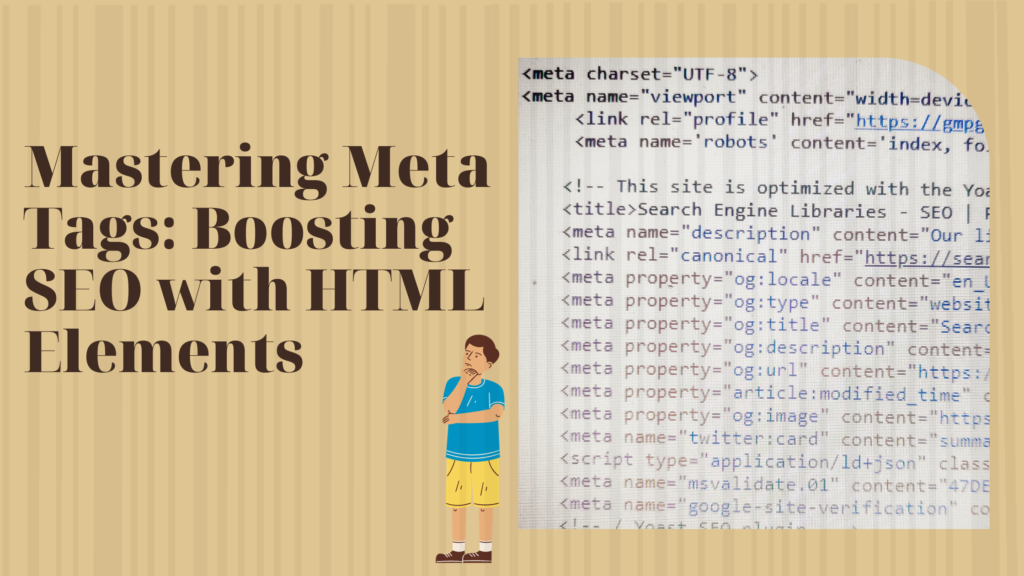In the ever-evolving landscape of digital marketing and online visibility, mastering the art of SEO (Search Engine Optimization) is essential. While there are numerous strategies and techniques to enhance your website’s ranking on search engines, one often-overlooked but highly influential aspect is meta tags. In this comprehensive guide, we will delve into the world of meta tags, explaining their significance and providing you with actionable insights to boost your website’s SEO effectively.
What Are Meta Tags?
Meta tags are snippets of HTML code embedded within a webpage’s header section. They offer valuable information to search engines about the content of your web page. While there are several types of meta tags, the most crucial ones for SEO include:
- Title Tag: The title tag is arguably the most important meta tag. It defines the title of your webpage and appears as the clickable link in search engine results pages (SERPs).
- Meta Description: The meta description provides a brief summary of your webpage’s content. It also appears in SERPs, just below the title tag, and aims to entice users to click through to your site.
- Meta Keywords: Although less relevant today, meta keywords used to be crucial for SEO. They listed keywords relevant to your content, helping search engines understand what your page was about.
- Viewport Meta Tag: This tag is responsible for ensuring your website displays correctly on various devices and screen sizes, making it crucial for user experience and SEO.
- Canonical Tag: The canonical tag specifies the preferred version of a webpage when there are duplicate or similar pages, reducing the risk of duplicate content penalties.
Why Are Meta Tags Important for SEO?
- Improved Click-Through Rates (CTR): A well-crafted title tag and meta description can entice users to click on your link in SERPs. By using compelling language and relevant keywords, you can increase your CTR, which indirectly boosts your SEO rankings.
- Keyword Relevance: Meta tags are an opportunity to reinforce the relevancy of your content to specific keywords. When search engines see that your meta tags align with your page content, it improves your ranking for those keywords.
- Reduced Bounce Rates: If your meta tags accurately represent your content, users are more likely to stay on your site after clicking through from a search result. This lowers your bounce rate, signaling to search engines that your content is valuable and relevant.
- Brand Consistency: Consistently using meta tags across your website reinforces your brand identity. This can lead to increased brand recognition and trust, which can indirectly impact your SEO efforts.
Best Practices for Meta Tags
Now that we understand the significance of meta tags, let’s delve into some best practices for optimizing them effectively:
- Keyword Research: Start by conducting thorough keyword research to identify the most relevant and high-traffic keywords for your content. Incorporate these keywords naturally into your title tag and meta description.
- Unique and Descriptive Title Tags: Each page on your website should have a unique title tag that accurately reflects its content. Keep it concise (around 60 characters) and compelling to encourage clicks.
- Compelling Meta Descriptions: Write meta descriptions that not only summarize your content but also pique the reader’s interest. Aim for around 150-160 characters to ensure they display correctly in SERPs.
- Avoid Keyword Stuffing: While it’s essential to use keywords, avoid overloading your meta tags with them. Keyword stuffing can lead to penalties from search engines.
- Mobile Optimization: Ensure that your viewport meta tag is optimized for mobile devices. With the increasing use of smartphones, mobile-friendly websites are favored by search engines.
- Regular Updates: Periodically review and update your meta tags to reflect changes in your content. Stale or outdated meta tags can harm your SEO efforts.
Common Mistakes to Avoid
To master meta tags effectively, it’s essential to avoid common pitfalls:
- Duplicate Meta Tags: Every page on your website should have unique meta tags. Duplicate tags can confuse search engines and negatively impact your SEO.
- Ignoring Meta Tags: Some website builders auto-generate meta tags, but these may not be optimized for SEO. Take the time to customize your meta tags for each page.
- Neglecting Mobile Optimization: As mentioned earlier, mobile optimization is crucial. Neglecting this aspect can lead to poor user experiences and lower search rankings.
- Neglecting Updates: The digital landscape is dynamic. Regularly review and update your meta tags to stay relevant and competitive.
Conclusion
In the world of SEO, mastering meta tags is a vital skill that can significantly boost your website’s visibility and traffic. By understanding the importance of meta tags, implementing best practices, and avoiding common mistakes, you can take a significant step toward enhancing your website’s SEO performance.
Remember that SEO is an ongoing process, and staying informed about the latest trends and algorithm updates is crucial. As you continue to optimize your meta tags and other SEO elements, your website’s search engine rankings will improve, leading to increased organic traffic and better online visibility. Start mastering meta tags today and watch your website climb the ranks in search engine results.


Pingback: What are most Common SEO Mistakes to avoid?
Pingback: What is the difference between SEO and SEM?
Pingback: What are meta tags, and how do they affect SEO?
Pingback: How important are header tags (H1, H2, etc.) in SEO?